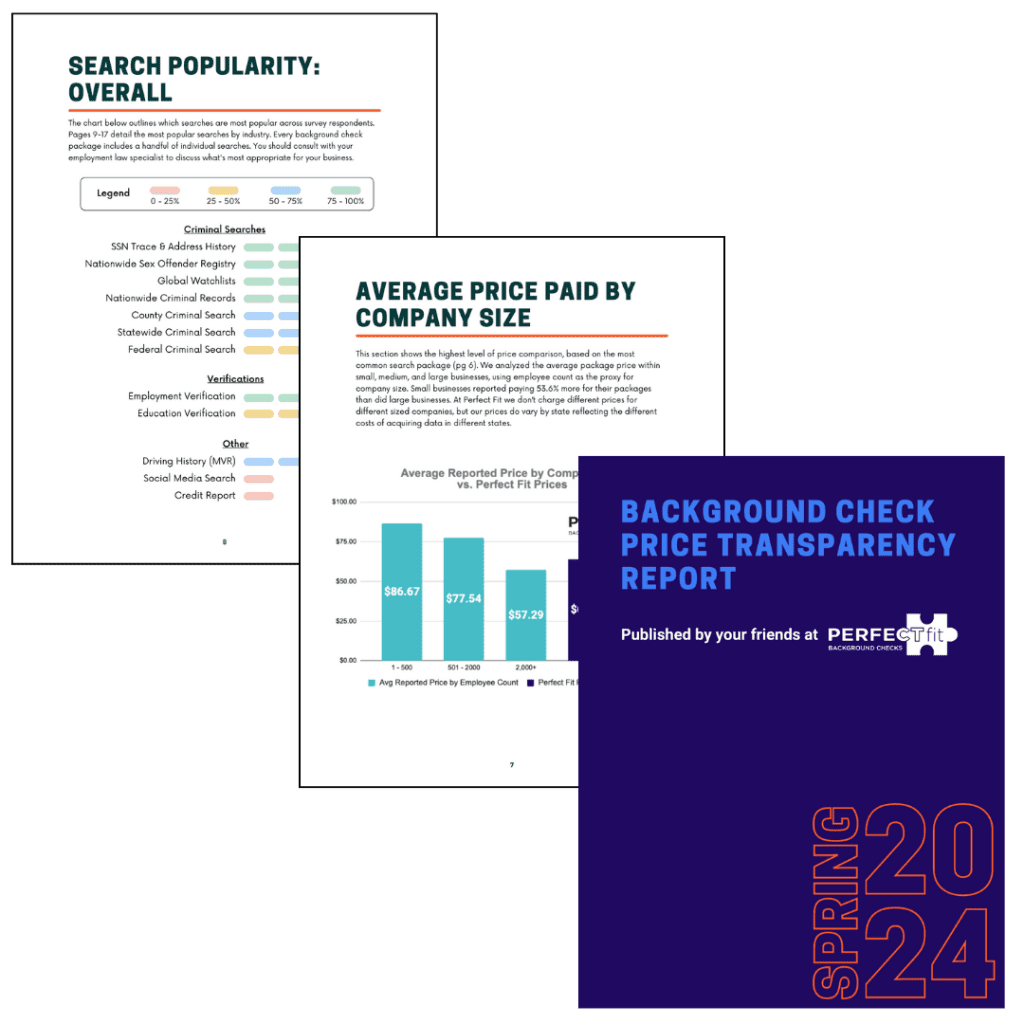How to run FCRA-compliant background checks
Adhering to the Fair Credit Reporting Act is crucial to your hiring and promotion process, but it doesn’t have to be complicated. Here we’ll cover the FCRA basics, two key things to keep in mind when running compliant background checks and how our compliant screening makes hiring easier for your business.
From the top, we have to advise you to consult your legal counsel on the hiring process within your business. The information shared here is for educational purposes only and does not constitute legal advice.
Searching for and hiring quality employees is a huge undertaking, and when it comes to screening applicants – it should be quick and straightforward. A qualified background check provider can make the process more efficient and support employers in complying with federal laws. However, employers are responsible for ensuring that they are meeting the requirements and obligations of the Fair Credit Reporting Act – or FCRA. Disregarding or even misunderstanding FCRA regulations can lead to lawsuits with lengthy litigation and costly settlements.
What is the Fair Credit Reporting Act?
The FCRA was created to maintain fair, accurate and efficient reporting of information researched into the credit, character, reputation, personal characteristics or mode of living of a person. The reports must be done by a consumer reporting agency (that’s us!). Reports can include criminal records, records of civil judgment, drug testing results, witness statements, and/or financial history, to name a few.
The act is meant to protect consumers and prevent businesses from intentionally or negligently disregarding the laws around consumer reports. Lawsuits filed for alleged FCRA violations have become more common in recent years, and many cases are class action lawsuits with some settlements in the millions of dollars. It’s imperative, especially for small and medium businesses to avoid violations – even unintentional ones.
Two Keys to FCRA Compliance
There are two key things to keep top of mind:
1) presenting the appropriate disclosure and authorization forms, and 2) how you handle adverse actions.
Disclosure and Authorization Requirements
Candidates must be notified of and give their permission for your company to run background checks. Whenever you place orders, ensure that your applicants are viewing and signing the appropriate disclosure and authorization forms. These forms simply and clearly let your candidate know that you will pull a background check for employment purposes and authorization must be signed by the applicant (in print or electronically).
Keep forms simple and to the point
The FCRA requires that you provide a “clear and conspicuous” written notice that consists “solely of the disclosure.” The disclosure needs to be clear and conspicuous – or noticeable – and exist as a standalone document. Do not include any superfluous information, legalese or attempt to bury the form.
How we help with disclosure forms
The disclosure and authorization forms needed may vary for different candidates based upon their location. Location-specific forms can be tricky for businesses hiring remote employees in a variety of locations. We simplify compliance with two of our order options, so that all you have to do is send your applicant a link to start the disclosure and authorization process. The applicant will provide their personal information, and from that info, we will present them with the appropriate forms for their e-signature. Once signed, these forms will be saved in your Perfect Fit account for future reference.
FCRA Adverse Action Requirements
An adverse action is when a company considers not hiring or promoting a candidate based on information included in a background check. The key word here is “consider” – meaning that an employment decision is not made solely from the info in the initial background check. Before employers disqualify a candidate based on background check information, they must follow the FCRA’s adverse action requirements, and ultimately consider the nature and gravity of the offense/conduct, when it occurred and whether it is relevant to the nature of the job sought or held.
If you plan to take an adverse action based on the results of an order, the FCRA requires the following procedures.
1. Give notice of Pre-Adverse Action.
This letter informs a candidate that information found in their background check may negatively impact their potential employment and the employer is considering adverse action. The notice letter must include a copy of the candidate’s background check and a copy of “A Summary of Your Rights Under the FCRA.” A Pre-Adverse notice gives an applicant the opportunity to dispute the accuracy of the information and/or provide an explanation with supporting facts and documents related to the crime, their rehabilitation efforts, work history, etc.
2. Allow time for the Adverse Action waiting period.
The hiring company must give a candidate a minimum of five business days* before sending the final Adverse Action notice. This allows the candidate time to dispute the findings in the background check – for example, if a court record is outdated or incorrect.
*Note: some states may require more time. Check your state’s local laws on the required adverse action waiting period. Our system automatically gives an applicant ten business days to reply.
3. Share the final Adverse Action notice.
You might ultimately conclude after performing the individualized assessment, that the offense still disqualifies the applicant. In that case, it is required to send a Final Adverse action decision. A decision statement must be sent that notifies a candidate that they will not be hired or an offer has been rescinded. A copy of the final background check related to the decision must be sent as well.
How we help with the Adverse Action process
Our platform helps manage the adverse action process through certain electronic processes, but Perfect Fit is more than just software – we’re people on your team. When you decide that you will take an adverse action based upon the results of the background check, we encourage you to reach out to us and allow us to help guide you through the process.
The Takeaway
While staying compliant is important, it doesn’t have to be difficult. When working with us for your background checks you can ensure you’re in good standing by following two simple rules:
- Use the ‘Invitation’ order method so that we take care of the authorization and disclosure forms on your behalf.
- If a background check is going to disqualify a candidate from an opportunity, reach out to our support team so that we can guide you through the adverse action process.
Ready to build your background check package?
DISCLAIMER
The material and information contained on this website is for general information purposes only. While every measure has been taken to ensure the accuracy of the material, Perfect Fit Background Checks does not guarantee the accuracy or completeness of the material found on this site. You should not rely upon the material or information on the website as a basis for making any business, legal or any other decisions.
Perfect Fit Background Checks will not be liable for any false, inaccurate, inappropriate or incomplete information presented on this website.
To the extent not prohibited by law, in no circumstances shall Perfect Fit Background Checks be liable to you or any other third parties for any loss or damage (including, without limitation, damage for loss of business or loss of profits) arising directly or indirectly from your use or inability to use, this site or any of the material contained in it.




